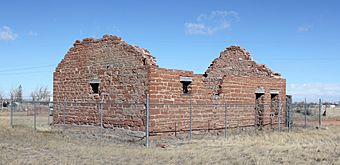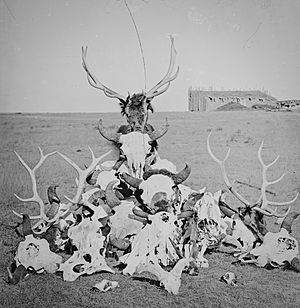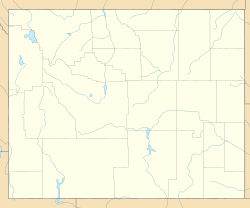Fort Sanders (Wyoming) facts for kids
Quick facts for kids |
|
|
Fort Sanders
|
|

The guardhouse in 2014.
|
|
| Location | Albany County, Wyoming, USA |
|---|---|
| Nearest city | Laramie, Wyoming |
| NRHP reference No. | 80004300 |
| Added to NRHP | May 1, 1980 |

Imagine a time when traveling across America was tough and dangerous. Fort Sanders was a wooden fort built in 1866 in southern Wyoming, near the city of Laramie. It was created to help keep people safe.
It was first called Fort John Buford. But soon, it was renamed Fort Sanders to honor General William P. Sanders. He was a brave soldier who died during the American Civil War. This was actually the second fort named after him!
The fort's first job was to protect travelers on the nearby Overland Trail. This trail was a busy route for pioneers heading west. Later, the soldiers at the fort also protected workers building the Union Pacific Railroad. This important railroad arrived in the area in 1868.
In 1869, the town of Laramie (originally called "Laramie City") grew up about 3 miles (5 km) north of the fort. Fort Sanders became less important after Fort D. A. Russell was built in Cheyenne in 1868. The War Department kept Fort Sanders open until 1882. After that, its buildings were sold.
Fort Layout
The fort grounds were about 223 feet (68 meters) wide and 400 feet (122 meters) long. This area included a large open space called a parade ground. A parade ground is where soldiers would gather for drills and ceremonies.
Fort Sanders was first built for four companies of soldiers. Later, it was made bigger to hold six companies. Most of the buildings were made of wood. However, the guardhouse was built from stone in 1869. This stone guardhouse is the only original building still standing at the fort site today!
At least two other buildings from the fort were moved to different places in Laramie. They are still used today. The post Commander's quarters, where the fort's leader lived, was moved to LaBonte Park. For many years, it has been used as a community center and a pre-school. Another building became the Cavalrymen Supper Club.
- L.C. Bishop, "Emigrant Trail Map Series: Fort Sanders", 1959
 | Frances Mary Albrier |
 | Whitney Young |
 | Muhammad Ali |



